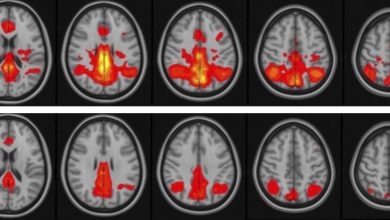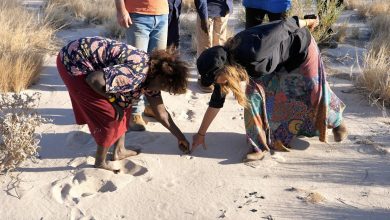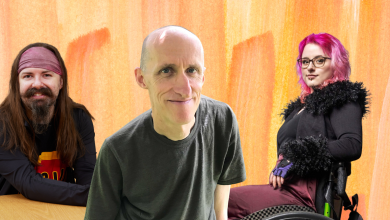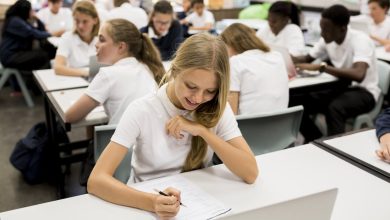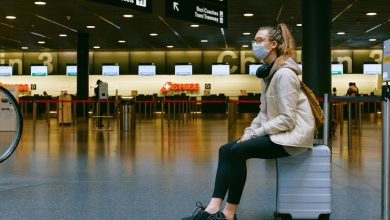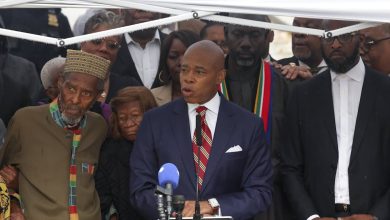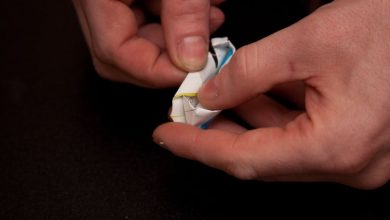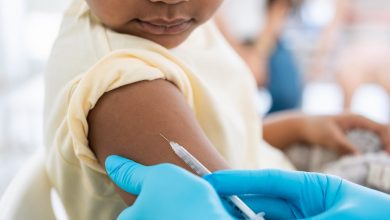National Day for Truth and Reconciliation
مجلة المذنب نت متابعات عالمية:
On Sept. 30, Canada will observe the National Day for Truth and Reconciliation. Formerly known as Orange Shirt Day, the now federal statutory day honours generations of Indigenous survivors, families and communities impacted by Canada’s residential school system and remembers the children who never returned home. It’s also a good time to honour the “Truth” in Truth and Reconciliation and check in on Canada’s progress on the 94 Calls to Action that came out of the Truth and Reconciliation Committee.
Here at Don’t Call Me Resilient, we’ve curated a playlist of episodes for you that explore the historical and current issues of Indigenous communities. Through the voices of experts, the playlist features discussions related to Indigenous history, justice, rights and resistance. In each episode, Indigenous scholars and experts present their research and ideas to help explain the issues. They dive deep into conversations about the importance of preserving and protecting Indigenous land, life and identity.
As a collection, these episodes invite listeners to engage in a process of learning and unlearning; to acknowledge the tragic legacies of residential schools in Canada and to move beyond a single day of remembrance. Individually, the conversations are thoughtful and informative explorations of Indigenous scholarship, living history and the future of reconciliation in Canada.
Indigenous Land Defenders
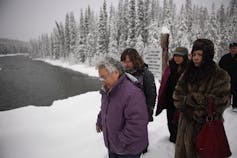
THE CANADIAN PRESS/Chad Hipolito
In this episode, two Indigenous land defenders from different nations as well as generations: Ellen Gabriel, a human rights activist and artist well known for her role during the 1990 Oka crisis, and Anne Spice, a professor at Toronto Metropolitan University, discuss the importance and urgency of defending land. They explain why they work to protect the land against invasive development and why their work is necessary for everyone’s survival. Also, check out Gabriel’s forthcoming book with Sean Carleton: When the Pine Needles Fall.
(first aired: March, 2021)
How stories about alternate worlds can help us imagine a better future
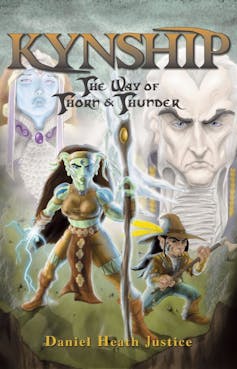
Kegedonce
Stories are a powerful tool to resist oppressive situations. They give writers from marginalized communities a way to imagine alternate realities, and to critique the one we live in. In this episode, Vinita speaks to two storytellers who offer up wonderous “otherworlds” for Indigenous and Black people. Selwyn Seyfu Hinds is an L.A-based screenwriter and the producer of Esi Edugyan’s Washington Black. Daniel Heath Justice is professor in Indigenous literature at the University of British Columbia and author of Why Indigenous Literatures Matter.
Stolen Identities: What does it mean to be Indigenous?
Over the last few years, we’ve seen a lot of high-profile figures accused of falsely claiming Indigenous identity, of being “Pretendians.” These cases have become big news stories, but they have big real-life consequences, too. Misidentifying as Indigenous can have financial and social consequences, with the misdirection of funds, jobs or grants meant for Indigenous peoples. Vinita delves into it all with two researchers who look at identity and belonging in Indigenous communities: Veldon Coburn and Celeste Pedri-Spade from McGill University.
(first aired: October, 2021)
Why pollution is as much about colonialism as chemicals
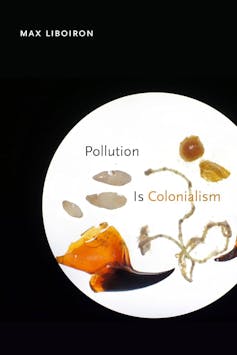
Duke University Press
The state of our environment keeps getting scarier and scarier: and we have yet to find a way forward. Two Indigenous scholars who run labs to address the climate crisis say bringing an Indigenous understanding to environmental justice could help us get unstuck. A big part of that is seeing pollution through a new lens — one that acknowledges it is as much about racism and colonialism as it is toxic chemicals. Vinita talks to Michelle Murphy at the University of Toronto, and Max Liboiron, author of Pollution is Colonialism, and associate professor at Memorial University of Newfoundland.
(first aired: November, 2021)
Making our food fairer
Over 17 per cent of households in Canada are food insecure. For racialized Canadians, that number is higher — two to three times the national average. In this episode, Vinita asks what is happening with our food systems, and what we can do to make them fairer with two women who have been tackling this issue for years. Melana Roberts is Chair of Food Secure Canada and one of the leaders behind Canada’s first Black food sovereignty plan. Also joining the conversation is Tabitha Robin Martens, assistant professor at UBC’s Faculty of Land and Food Systems. Martens researches Indigenous food sovereignty and works with Cree communities to bolster traditional land uses.
(first aired: November, 2021)
Unmarked graves of 215 Indigenous children were found in Kamloops a year ago: What’s happened since?
In this episode, we take a look at what has happened since the unmarked graves of 215 Indigenous children were found in Kamloops, B.C. in May 2021. Vinita speaks to Veldon Coburn, associate professor and faculty chair of the Indigenous Relations Initiative at McGill University about what happened, the widespread grief and outcry and the immediate political response, but also, how none of that lasted despite communities continuing to find bodies. Joining Vinita on the episode is Haley Lewis, then-Don’t Call Me Resilient producer and culture and society editor for The Conversation Canada. Lewis is mixed Kanyen’keha:ká from Tyendinaga and led our coverage of the findings.
(first aired: May, 2022)
Diamond mines are not a girl’s best friend
Since diamond mining started in Canada in 1998, Canada has become the third-largest producer of diamonds in the world. In 2019, the inquiry into missing and murdered Indigenous women and girls linked resource extraction to spikes in violence against women. In this episode, we hear from two women who talk about how diamond mines in the Northwest Territories have negatively impacted and perpetuated gender violence, particularly among Indigenous women. Vinita chats with Rebecca Hall, assistant professor of global development studies at Queen’s University and the author of Refracted Economies: Diamond Mining and Social Reproduction in the North, and Della Green, former victim services co-ordinator, at the Native Women’s Association of the Northwest Territories.
(first aired: June, 2022)
Has the meaning behind the Canadian flag changed?
After weeks of the so-called Freedom Convoy in 2022, many of us took a hard look at the symbolism of the Canadian flag and the attempt to associate it with white supremacy. Some felt a new fear or anger at what they feel the flag represents. But other communities say they have always felt this way about the Canadian flag. Both our guests on this episode have studied multiculturalism, citizenship and belonging. Daniel McNeil looks at history and culture and the complexities of global Black communities. He is a professor and Queen’s National Scholar Chair in Black Studies at Queen’s University. Lucy El-Sherif is an assistant professor of global peace and social justice at McMaster University. They help us unpack the meaning and symbolism of the Canadian flag.
(first aired: June, 2022)
How to decolonize journalism
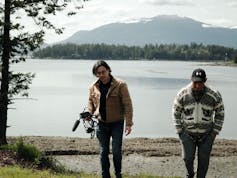
(Rocky James/CBC), Author provided (no reuse)
For decades, Canadian media have covered Indigenous communities with a heavy reliance on stereotypes — casting Indigenous Peoples as victims or warriors. This deep-seated bias in the news can have unsettling consequences for both how a community perceives itself as well as how others perceive them. Award-winning Anishinaabe journalist and former CBC reporter Duncan McCue is trying to change that both in the classroom and in the newsroom. He joins Vinita to talk about what Canadian media could be doing better.
(first aired: November, 2022)
About the Queen, the Crown’s crimes and how to talk about the unmourned
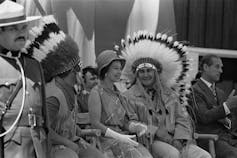
The Canadian Press
When the Queen died, there was a tremendous outpouring of love and grief for her and the monarchy she represented. But not everyone wanted to take a moment of silence — and there are a lot of reasons why. For example, the head of the Assembly of First Nations, RoseAnne Archibald told CTV News that the Royal Family should apologize for the failures of the Crown… “particularly for the destructiveness of colonization on First Nations people.” To explore these ideas further, we reached out to two scholars, Veldon Coburn, associate professor and faculty chair of the Indigenous Relations Initiative at McGill University and Cheryl Thompson, an associate professor of media and culture at Toronto Metropolitan University. Both say that the Queen’s death could be a uniting moment of dissent for people from current and former colonies.
(first aired: September, 2022)
The Vatican just renounced a 500-year-old doctrine that justified colonial land theft… Now what?
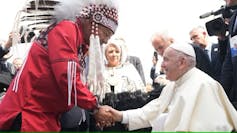
Nathan Denette/The Canadian Press via AP)
In 2023, the Vatican repudiated the Doctrine of Discovery, a 500-year-old decree used to justify settler colonialism. In this episode, political and Indigenous studies scholar Veldon Coburn explains why the Vatican’s repudiation of the Doctrine is a huge symbolic victory. We also examine what this repudiation may mean for members of Indigenous Nations, what prompted this renouncement, and what still needs to happen.
(first aired: April, 2023)
Digging into the colonial roots of gardening
In this episode, we explore how the practice of gardening is deeply tied to colonialism that affects what we plant and also, who gets to garden. But there is also a growing understanding that centuries-old Indigenous land-based knowledge and practices can foster a more resilient landscape. We speak to community activist Carolynne Crawley — a woman with Mi’kmaw, Black and Irish ancestry who leads workshops and walks that integrate Indigenous teachings into practice — and Jacqueline L. Scott — a PhD candidate at the University of Toronto’s Ontario Institute for Studies in Education whose research focuses on the wilderness and making it a welcoming space for Black people. We discuss a new way forward, discussing practical gardening tips with an eye to Indigenous knowledge.
(first aired: May, 2023)
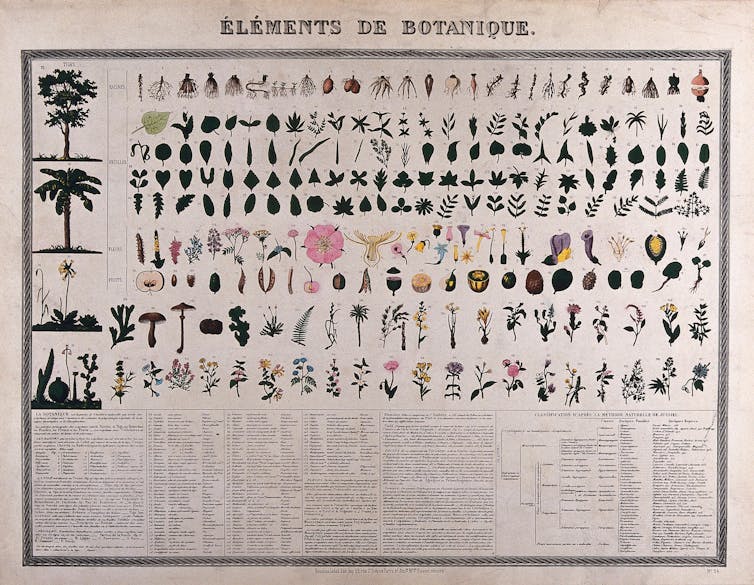
CC BY
Why preserving Indigenous languages is so critical to culture
This episode tackles why the revitalization of Indigenous languages is so critical. Guest host Veldon Coburn speaks with Frank Deer, professor of education at the University of Manitoba, to tackle the issue of disappearing Indigenous languages. They delve into how language reflects philosophies that guide political, cultural and ecological relationships — and discuss what more needs to be done to revitalize them.
(first aired: June, 2023)
Inside the search for the unmarked graves of children lost to Indian Residential Schools
In this episode, we take you inside the ongoing quest to document the children who died in Canada’s Indian Residential Schools system. Vinita speaks to Terri Cardinal, associate vice president of Indigenous initiatives and engagement at MacEwan University, about the search she led to uncover the unmarked graves of those who perished at the Blue Quills Residential School in Alberta. It’s deeply personal and emotional work for Cardinal, whose own father is a survivor of the school. Cardinal talks about what she found, how she felt, and what she hopes will come of it. She says the number of unmarked graves across the country is much higher than many of us could have imagined. And she says it’s important to keep shining a light on the rising numbers, especially with so many Canadians in denial about what really happened at these schools.
(first aired: September, 2023)
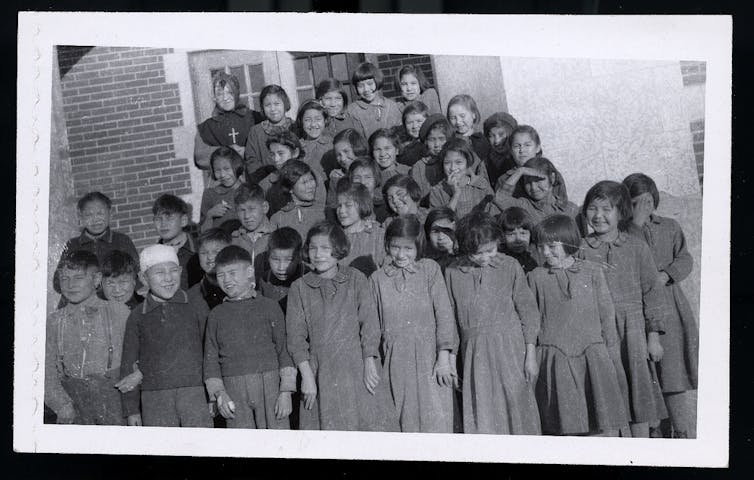
Provincial Archives of Alberta, CC BY
How journalists tell Buffy Sainte-Marie’s story matters – explained by a ‘60s Scoop survivor
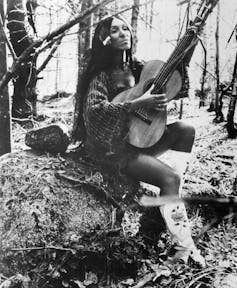
CMA/wikicommons, CC BY
Lori Campbell, a ‘60s Scoop survivor and associate vice president of Indigenous engagement at the University of Regina, challenges the CBC’s motives in releasing an investigation that questioned the Indigenous roots of legendary singer-songwriter Buffy Sainte-Marie in this episode. Campbell asks: was the story in service of truth and reconciliation or a sensationalist headline? She also highlights the turmoil the story is causing, especially among Indigenous communities in Saskatchewan, home to the Piapot Nation that embraced Sainte-Marie.
(first aired: November, 2023)
Colonialists used starvation as a tool of oppression
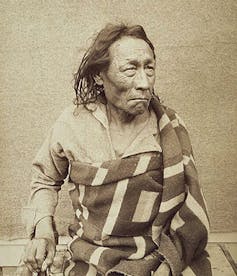
(Library and Archives Canada), CC BY
Vinita speaks to two famine scholars about the use of starvation as a tool in the colonizer’s playbook through two historic examples — the attempted decimation of Indigenous populations in the Plains, North America and the 1943 famine in Bengal, India. Our guests James Daschuk from the University of Regina and Janam Mukherjee at Toronto Metropolitan University discuss how colonial forces inflicted famine upon Indigenous populations to control them, their land, and their resources.
(first aired: March, 2024)
From stereotypes to sovereignty: How Indigenous media makers assert narrative control
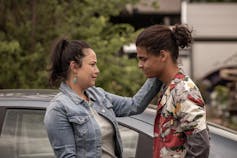
Shane Brown/FX
Indigenous media in North America have rapidly expanded over the last 30 years, with Indigenous media makers gaining greater control of their own narratives, including the ability to subvert colonial representations. Karrmen Crey, who is Stó:lō from Cheam First Nation, is an associate professor in the School of Communication at Simon Fraser University in Burnaby, British Columbia, and the author of “Producing Sovereignty: The Rise of Indigenous Media in Canada.” In this special episode, recorded on-site with an audience in Vancouver at Iron Dog books, Crey speaks with Vinita about the ways Indigenous creators are using humour along with a sharp critique of pop culture to show just how different the world looks when decision-making power over how stories get told shifts and Indigenous media makers take control.
(first aired: April, 2024)
نشكركم على قراءة المنشور عبر مجلة المذنب نت, المتخصصة في التداول والعملات الرقمية والمشفرة
